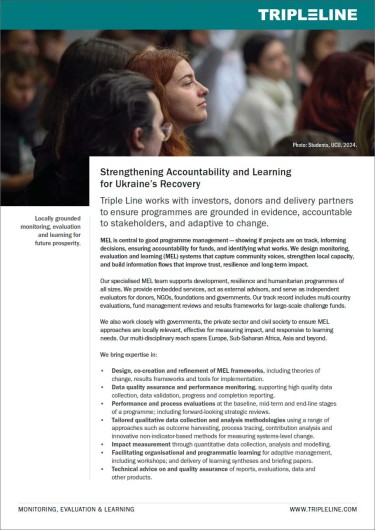Ukraine's recovery is not only about rebuilding infrastructure — it's a test of accountability, transparency, and trust. As the country rebuilds, effective Monitoring, Evaluation, and Learning (MEL) will be central to ensuring recovery is inclusive, adaptive, and trusted by the communities it serves.
The challenge ahead
Large-scale recovery carries risks: funds may be misspent, projects may lag behind changing realities, and communities could lose faith. MEL helps address these risks by moving beyond counting outputs — such as schools rebuilt or jobs created — to assessing the broader effects on markets, livelihoods, and institutions. This requires systems that are responsive, transparent, and trusted by citizens.
Our experience shows that recovery efforts falter when data is weak, feedback loops are absent, or accountability is unclear. For Ukraine, MEL must be designed not just to track progress but to strengthen legitimacy and build confidence in the recovery process.
What experience tells us
- Enabling adaptation — In fragile and fast-changing contexts, MEL functions must do more than record performance: they must allow programmes to pivot when strategies no longer fit shifting needs and priorities.
- Avoiding wasted investment — In global anti-corruption programmes, adaptive MEL enabled funders to redirect resources mid-course, preventing losses.
- Valuing social investment — Across Africa and Asia, cost–benefit studies on childcare and agricultural services have demonstrated the economic returns of social programmes, guiding smarter investment.
- Elevating excluded voices — Through learning partnerships, we have ensured participatory evidence-gathering that foregrounds the perspectives of women, youth, refugees, and other marginalised groups.
These experiences demonstrate that credible data, inclusive methods, and adaptive management can transform recovery from a technical exercise into a process that fosters legitimacy and trust.
Experience relevant to Ukraine
- Accountability to citizens as well as donors — MEL must demonstrate not only compliance but also responsiveness to the needs and voices of displaced people, youth, and communities.
- Inclusive evidence generation — Participatory approaches, such as outcome harvesting and most significant change, can surface perspectives often missed in conventional monitoring.
- Learning loops for adaptation — Recovery programmes should be designed with mechanisms for real-time learning, enabling rapid adjustments as conditions shift.
A partner for Ukraine’s recovery
Triple Line’s role is not simply to provide technical services, but to help governments and partners embed accountability, learning, and evidence at the heart of recovery.
With over 25 years of global experience in MEL — from strategic evaluations to embedded monitoring practices — we bring the perspective that recovery is not just about rebuilding, but about creating systems that endure, adapt, and deliver for citizens.
For further information, please download our Ukraine Monitoring, Evaluation & Learning PDF overview below, or contact Ricardo Pinto.




